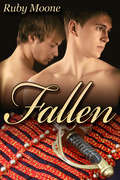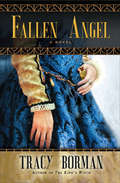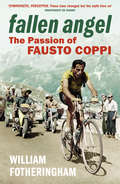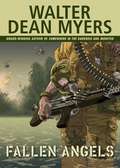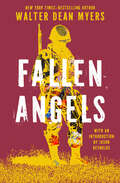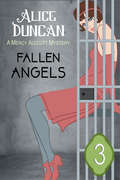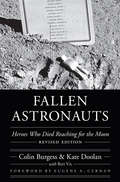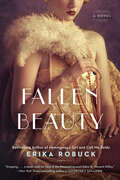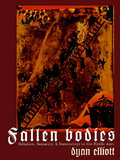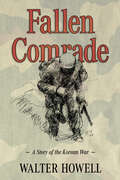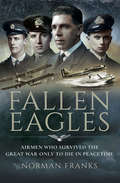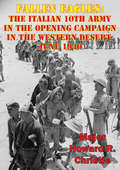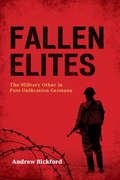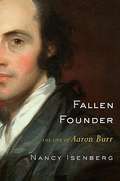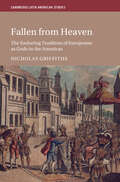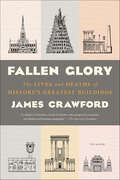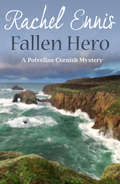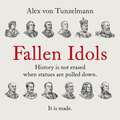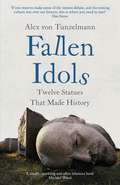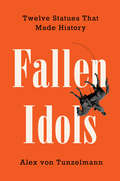- Table View
- List View
Fallen
by Cindy HolbyA British officer with a tormented past finds his true love, but not without losing a hard-fought battle, a much-prized horse, and his heart.
Fallen
by Lia MillsFallen by Lia Mills - a remarkable love story amidst the ruins of the First World War and the Easter RisingSpring, 1915. Katie Crilly gets the news she dreaded: her beloved twin brother, Liam, has been killed on the Western Front. A year later, when her home city of Dublin is suddenly engulfed in violence, Katie finds herself torn by conflicting emotions. Taking refuge in the home of a friend, she meets Hubie Wilson, a friend of Liam's from the Front. There unfolds a remarkable encounter between two young people, both wounded and both trying to imagine a new life. Lia Mills has written a novel that can stand alongside the works of Sebastian Faulks, Pat Barker and Louisa Young.SELECTED AS THE 2016 'ONE CITY ONE BOOK' TITLE FOR BOTH DUBLN AND BELFAST'Lia Mills writes superbly about the human heart. This is an historical story with an urgency that is completely modern: Fallen is shot through with the pleasure and the difficulty of being alive' Anne Enright, winner of the Man Booker Prize'Tremendously passionate, vivid and humane ... Mills has an exquisite eye for the telling image' Irish Independent'Absorbing ... Mills is a fine storyteller' Sunday Times'Vivid ... a careful study of how grief, oppression, violence and, above all, the imperative to follow orders can blight people's lives' Irish Mail on Sunday'Powerful ... Katie is a brilliantly realised heroine ... humane and compelling' Sunday Business Post'[An] intelligent, beautifully written tale of ordinary people in troubled times' Sunday Independent
Fallen
by Ruby MooneMajor Oliver Thornley never expected to see the man who saved his life at the battle of Waterloo again. He certainly never expected to fall over him in the street. When Thornley stumbles over a pile of rags, he is horrified to discover it is the man who dragged him from the battlefield to safety.Taking the man back to his Mayfair home, Thornley nurses Daniel back to health as he battles with his own forbidden desires. Then he learns Daniel shares his feelings, as well. Though it feels so right when they are in each other’s arms, Thornley knows their mutual secret could see them hang.Is there a way for them to be together despite the class difference that separates them? Can he admit he’s fallen in love before Daniel leaves for good?
Fallen Angel
by Elizabeth ThorntonFrom the USA TODAY bestselling author."I consider Elizabeth Thornton a major find." —Mary Balogh, NEW YORK TIMES bestselling author of ONLY ENCHANTINGBeautiful, fiery Scotswoman Maddy Sinclair held one man responsible for the scandal and tragedy that ruined her family: Viscount Deveryn, better known as The Fallen Angel. But when Maddy fell blindly into his powerful embrace, she was unaware the man who kissed her so skillfully was her sworn enemy. Now it is much too late, for though her heart may be lost, her will to foil Deveryn's scheme to steal her legacy is stronger than ever. Deveryn had his sights set on Maddy's castle and her tempting beauty—but not her affections. That changed as he found himself challenged by her wit, her guile, and her ability to turn the tables on his best laid plans, offering him a lesson in seduction that proved heaven does indeed exist on earth—and that perhaps only one thing can redeem a fallen angel.
Fallen Angel
by Sophia JamesHeaven on earth is in reach for a mysterious woman and the duke who can’t help winning her heart in this dazzling Victorian romance.Nicholas Pencarrow, Duke of Westbourne, is intrigued by the woman who saves his life and then vanishes. Queries as to her identity turn up the name of Brenna Stanhope, although every attempt to make contact with this beautiful mystery lady is politely rebuffed.Brenna has a dark secret she must keep buried, so she has built a respectable, uncomplicated world about herself where she avoids all male advances. Although, against her better judgment, this determined man keeps breaking through. Could she risk harming Nicholas’s reputation by lowering her guard just once?
Fallen Angel: A Novel
by Tracy BormanThe gripping conclusion to the historical trilogy featuring Stuart-era healer Frances Gorges—from the author of The King&’s Witch and The Devil&’s Slave. Life has never been quiet for Frances Gorges at the court of King James, but after finding herself at the center of plots and conspiracies for many years both as an accused witch and a secret Catholic, by 1614 Frances hopes to distance herself from the decadence and ruthlessness of the aging and venal monarch. However, when a handsome stranger appears at a courtier&’s country estate, he immediately draws the wandering eyes of the King, throwing the established order of the court into upheaval. George Villiers is ambitious and violent, ready to take down whatever—and whoever—stands in his way, including Frances and her husband Sir Thomas Tyringham. New friends and old alliances—from Francis Bacon and Prince Charles to Sir Walter Raleigh—will offer Frances ways to resist the treachery of Villiers, but danger and Catholic plotting always lurks just around the corner, and sometimes from unexpected sources. With her meticulous eye for detail and evocative storytelling, Tracy Borman&’s The Fallen Angel is a riveting conclusion to her trilogy set during the first Stuart monarch&’s reign. Praise for The Devil&’s Slave &“Gripping historical fiction with a daring character in Lady Frances.&”—New York Journal of Books Praise for The King&’s WitchNamed a Best Summer Debut by Library Journal &“Vivid . . . Everything you would want to read in a novel, ranging from palatial royals and intrigues to betrayals to a love story.&”—Washington Book Review, &“Essential Novels for This Summer&”
Fallen Angel: The Passion of Fausto Coppi
by William FotheringhamVoted the most popular Italian sportsman of the twentieth century, Fausto Angelo Coppi was the campionissimo - champion of champions. The greatest cyclist of the immediate post-war years, he was the first man to win cycling's great double, the Tour de France and Tour of Italy in the same year - and he did it twice. He achieved mythical status for his crushing solo victories, world titles and world records. But his significance extends far beyond his sport. Coppi's scandalous divorce and controversial early death convulsed a conservative, staunchly Roman Catholic Italy in the 1950s. At a time when adultery was still illegal, Coppi and his lover were dragged from their bed in the middle of the night, excommunicated and forced to face a clamorous legal battle. The ramifications of this case are still being felt today.In Fallen Angel, acclaimed cycling biographer, William Fotheringham, tells the tragic story of Coppi's life and death - of how a man who became the symbol of a nation's rebirth after the disasters of war died reviled and heartbroken. Told with insight and intelligence, this is a unique portrait of Italy and Italian sport at a time of tumultuous change.
Fallen Angels
by Walter Dean MyersOn a jungle battlefront where one misplaced step could be any soldier's last, every move can mean the difference between death and survival. Perry, Lobel, Johnson, Brunner, and Peewee are in Vietnam, all hoping to make it out alive.<P><P>Winner of the Coretta Scott King Medal
Fallen Angels
by Walter Dean MyersIn this classic coming of age novel from a New York Times–bestselling author, an American teenager faces the gritty reality of the Vietnam War. Winner of the Coretta Scott King Award in 1988&“Heartbreaking. . . . Other authors have gotten the details right, but Myers reaches into the minds of the soldiers. . . . Readers, including those born after the fall of Saigon . . . will reel from the human consequences of battle.&” —Publishers Weekly (boxed review) It&’s 1967, and Harlem teenager Richie Perry is graduating from high school. He dreams of attending college and becoming a writer like James Baldwin. However, reality has other plans. After volunteering for the army, Perry doesn&’t expect to fight in the Vietnam War, but a paperwork mix-up sends him to the frontlines. Perry and his platoon are soon face-to-face with relentless violence and brutality. One false move can mean the difference between survival and death, whether they are fighting the Vietcong or simply walking through the jungle. Overcome by the horrors, Perry begins questioning everything. What were his motives for joining the army? Why are black troops given the most dangerous missions? Why is the United States even there? Perry and his fellow soldiers may have all come to Vietnam for different reasons, but now they share the same dream—to get home alive. &“Recalls Stephen Crane&’s The Red Badge of Courage.&” —Horn Book (starred review)&“As thought-provoking as it is entertaining.&” —The New York Times&“This gut-twisting Vietnam War novel breaks uncharted ground. . . . Myers does an outstanding job of re-creating the war.&” —Booklist (starred review) &“Myers masterfully re-creates the combat zone. . . . War-story fans will find enough action here, though it isn&’t glorified; thoughtful readers will be haunted by this tribute to a ravaged generation.&” —Kirkus Reviews (starred review)
Fallen Angels: Historical Cozy Mystery (Mercy Allcutt Mystery #3)
by Alice DuncanAngelica Gospel Hall Member Murdered, Local P.I. Suspected in Fallen Angels, a Historical Cozy Mystery from Alice Duncan--1926, Los Angeles, CA--Mercy Allcutt has had exciting times as secretary to private investigator, Ernie Templeton. While it’s true she’s been in what she considers a wee bit of trouble--Ernie considers out-and-out danger--a time or two, she’s determined to continue learning the ways of the “real” world.However, when she sets out to find her wandering boss, Ernie, one hot September afternoon, she not only discovers a corpse, she also finds Ernie, bound and gagged. Even worse, when the police arrive to investigate the crime, they peg Ernie as the killer.Mercy isn’t about to let the police get away with that, no matter how many times Ernie tells her to butt out of the case. The only question is whether she’ll survive her investigatory efforts before she becomes one more “Fallen Angel.”Publisher Note: Readers who enjoy cozy mysteries in historical settings are sure to appreciate the Mercy Allcutt series set in 1920s Los Angeles, California. No vulgarity or explicit sex for those who appreciate a clean and wholesome read.Winner of:The 2012 NM/AZ book of the year award for mystery"Mercy Allcutt is a delight." ~Carola DunnThe Mercy Allcutt Mystery SeriesLost Among the AngelsAngels FlightFallen AngelsAngels of MercyThanksgiving Angels
Fallen Astronauts: Heroes Who Died Reaching for the Moon, Revised Edition (Outward Odyssey: A People's History of Spaceflight)
by Colin Burgess Kate Doolan Eugene A. CernanNear the end of the Apollo 15 mission, David Scott and fellow moonwalker James Irwin conducted a secret ceremony unsanctioned by NASA: they placed on the lunar soil a small tin figurine called The Fallen Astronaut, along with a plaque bearing a list of names. By telling the stories of those sixteen astronauts and cosmonauts who died in the quest to reach the moon between 1962 and 1972, this book enriches the saga of humankind’s greatest scientific undertaking, Project Apollo, and conveys the human cost of the space race. Many people are aware of the first manned Apollo mission, in which Gus Grissom, Ed White, and Roger Chaffee lost their lives in a fire during a ground test, but few know of the other five fallen astronauts whose stories this book tells as well, including Ted Freeman and C.C. Williams, who died in the crashes of their T-38 jets; the “Gemini Twins,” Charlie Bassett and Elliot See, killed when their jet slammed into the building where their Gemini capsule was undergoing final construction; and Ed Givens, whose fatal car crash has until now been obscured by rumors. Supported by extensive interviews and archival material, the extraordinary lives and accomplishments of these and other fallen astronauts—including eight Russian cosmonauts who lost their lives during training—unfold here in intimate and compelling detail. Their stories return us to a stirring time in the history of our nation and remind us of the cost of fulfilling our dreams. This revised edition includes expanded and revised biographies and additional photographs.
Fallen Beauty
by Erika Robuck'Without sin, can we know beauty? Can we fully appreciate the summer without the winter? No, I am glad to suffer so I can feel the fullness of our time in the light. 'Upstate New York, 1928. Laura Kelley and the man she loves sneak away from their judgmental town to attend a performance of the scandalous Ziegfeld Follies. But the dark consequences of their night of daring and delight reach far into the future . . . That same evening, Bohemian poet Edna St. Vincent Millay and her indulgent husband hold a wild party in their remote mountain estate, hoping to inspire her muse. Millay declares her wish for a new lover who will take her to unparalleled heights of passion and poetry, but for the first time, the man who responds will not bend completely to her will. . . . Two years later, Laura, an unwed seamstress struggling to support her daughter, and Millay, a woman fighting the passage of time, work together secretly to create costumes for Millay's next grand tour. As their complex, often uneasy friendship develops amid growing local condemnation, each woman is forced to confront what it means to be a fallen woman . . . and to decide for herself what price she is willing to pay to live a full life. 'Lovers of the Jazz Age, literary enthusiasts, and general historic fiction readers will find much to love about Call Me Zelda. Highly recommended. ' Historical Novel Society, Editors' Choice
Fallen Bodies
by Dyan ElliottMedieval clerics believed that original sin had rendered their "fallen bodies" vulnerable to corrupting impulses--particularly those of a sexual nature. They feared that their corporeal frailty left them susceptible to demonic forces bent on penetrating and polluting their bodies and souls.Drawing on a variety of canonical and other sources, Fallen Bodies examines a wide-ranging set of issues generated by fears of pollution, sexuality, and demonology. To maintain their purity, celibate clerics combated the stain of nocturnal emissions; married clerics expelled their wives onto the streets and out of the historical record; an exemplum depicting a married couple having sex in church was told and retold; and the specter of the demonic lover further stigmatized women's sexuality. Over time, the clergy's conceptions of womanhood became radically polarized: the Virgin Mary was accorded ever greater honor, while real, corporeal women were progressively denigrated. When church doctrine definitively denied the physicality of demons, the female body remained as the prime material presence of sin.Dyan Elliott contends that the Western clergy's efforts to contain sexual instincts--and often the very thought and image of woman--precipitated uncanny returns of the repressed. She shows how this dynamic ultimately resulted in the progressive conflation of the female and the demonic, setting the stage for the future persecution of witches.
Fallen Comrade: A Story of the Korean War
by Walter HowellFallen Comrade: A Story of the Korean War presents an account of three young men from Clinton, Mississippi, who served in the US Marine Corps during the Korean War. Waller King, Joe Albritton, and Homer Ainsworth were childhood friends who grew up in the same neighborhood, went to the same schools, attended the same church, and eventually joined the same Marine Corps reserve unit in Jackson. Through extensive interviews with people who knew them, as well as excerpts from their letters and journals, this volume traces the life experiences of King, Albritton, and Ainsworth through their adolescence and into the war. Despite their shared origins, the three young men met different fates. Ainsworth was in Korea just two months before he was killed. Albritton and King returned home after the war, but Albritton died tragically in an automobile accident mere weeks later. King went on to college and experienced success in business, the joys of a family, and the rewards of community service, all of which were denied his childhood friends by their early deaths. Part biography and part military history, Fallen Comrade examines what happened to three young men from Clinton, their childhood in small-town Mississippi, their service as Marines in Korea, and their legacy to their hometown.
Fallen Eagles: Airmen Who Survived The Great War Only to Die in Peacetime
by Norman FranksThe 50 pilots featured in Fallen Eagles were all decorated for bravery during The Great War. All survived the conflict only to die flying in the postwar years.The causes of their deaths ranged from being casualties of small wars, then as now rife in the Middle East, mechanical failure or pilot error. The 1920s were still pioneering years for aviation and aviators and test flying, air races and displays, record attempts etc were fraught with dangers known and unknown.In addition to the better known names such as Sir John Alcock, Captain W Beauchamp-Proctor VC and Sammy Kincaid there are many that will be unfamiliar to all but the most ardent enthusiasts. But all have courage and love of flying in common and sadly luck ran out for each of these men who made a contribution to the history of flight. Thanks to acclaimed aviation historian Norman Franks, their names are not forgotten.
Fallen Eagles: The Italian 10th Army In The Opening Campaign In The Western Desert, June 1940
by Major Howard R. ChristieThe Italian Army developed a sound and unique combined arms doctrine for mechanized warfare in 1938. This new doctrine was called the "War of Rapid Decision." It involved the use of mechanized warfare in the Italian version of the blitzkrieg. This doctrine evolved from the lessons learned in the Italian-Ethiopian War of 1935 to 1936 and the Spanish Civil War of 1936-1939. With Italy's entry into World War II, military operations ensued along the Libyan-Egyptian border between the Italian 10th Army and a much smaller British Western Desert Force. The Italian Army in Libya outnumbered the British Army in Egypt by a ratio of four to one. The setting seemed to be ideal for the employment of the War of Rapid Decisions. Moreover, Marshal Rodolfo Graziani, who was the commander of the Italian 10th Army in North Africa during its first campaign in the western desert, had pioneered this new form of mechanized warfare during the Ethiopian War. Surprisingly, the Italian forces in Libya did not employ their new doctrine, reverting instead to more conventional techniques of "mass." It was Graziani's failure to utilize the doctrine which he had helped to develop that led to Italy's embarrassing defeat in 1941.
Fallen Elites
by Andrew BickfordBickford (anthropology, George Mason U. ) offers an intriguing view of how countries create soldiers and the consequences to them when military elites fall. The author delves into the lives of former East German military officers in unified Germany and tells the story of how they and their families dealt with the reunification, capitalism, and citizenship after the fall of the Berlin Wall in 1989. Annotation ©2011 Book News, Inc. , Portland, OR (booknews. com)
Fallen Founder: The Life of Aaron Burr
by Nancy IsenbergA controversial challenge to the works of Ron Chernow and David McCullough Lin-Manuel Miranda's play "Hamilton" has reignited interest in the founding fathers; and it features Aaron Burr among its vibrant cast of characters. With Fallen Founder, Nancy Isenberg plumbs rare and obscure sources to shed new light on everyone's favorite founding villain. The Aaron Burr whom we meet through Isenberg's eye-opening biography is a feminist, an Enlightenment figure on par with Jefferson, a patriot, and--most importantly--a man with powerful enemies in an age of vitriolic political fighting. Revealing the gritty reality of eighteenth-century America, Fallen Founder is the authoritative restoration of a figure who ran afoul of history and a much-needed antidote to the hagiography of the revolutionary era.From the Trade Paperback edition.
Fallen From Heaven: The Enduring Tradition of Europeans as Gods in the Americas (Cambridge Latin American Studies)
by Nicholas GriffithsDebunking the so-called apotheosis myth, Nicholas Griffiths argues that Indigenous peoples in North America, Mexico, the Andes, and Hawaii during the early modern period (1492–1789) did not believe invading Europeans were gods. Instead, many perceived them as 'more-than-human' intruders of considerable spiritual power. By exploring the Indigenous context and terminology, using published primary and secondary sources, the book investigates what natives meant when they used words that Europeans translated as 'gods.' In contrast to traditional accounts, Griffiths centers native points of view and the dynamic interactions between European and Indigenous perspectives. Ultimately, both groups were fundamentally comparable since both interpreted their mutual contact in terms of their pre-existing mythology. The traditional contrast between the scientific, rational, and modern Europeans on the one hand, and the myth-bound, irrational, pre-modern Indigenous peoples on the other, is entirely misleading. The first book-length synthesis of this myth, Griffiths reinterprets ideas that have long been debated in various regional literatures.
Fallen Glory: The Lives and Deaths of History's Greatest Buildings
by James Crawford“A narrative that spans seven millennia, five continents and even reaches into cyberspace. . . . I savored each page.” —Henry Petroski, Wall Street JournalIn Fallen Glory, James Crawford uncovers the biographies of some of the world’s most fascinating lost and ruined buildings, from the dawn of civilization to the cyber era. The lives of these iconic structures are packed with drama and intrigue, featuring war and religion, politics and art, love and betrayal, catastrophe and hope. They provide the stage for a startling array of characters, including Gilgamesh, the Cretan Minotaur, Agamemnon, Nefertiti, Genghis Khan, Henry VIII, Catherine the Great, Adolf Hitler, and even Bruce Springsteen.The twenty-one structures Crawford focuses on include The Tower of Babel, The Temple of Jerusalem, The Library of Alexandria, The Bastille, Kowloon Walled City, the Berlin Wall, and the Twin Towers of the World Trade Center. Ranging from the deserts of Iraq, the banks of the Nile and the cloud forests of Peru, to the great cities of Jerusalem, Istanbul, Paris, Rome, London and New York, Fallen Glory is a unique guide to a world of vanished architecture. And, by picking through the fragments of our past, it asks what history’s scattered ruins can tell us about our own future.“Witty and memorable . . . moving as well as myth-busting.” —Times Literary Supplement (UK)“[An] elegant, charged book . . . A well-written prize for students of history, archaeology, and urban planning.” —Kirkus Reviews, starred review“Astute, entertaining, and affecting.” —Booklist“A lovely, wise book.” —Alexander McCall Smith, New Statesman (UK)“A cabinet of curiosities, a book of wonders with unexpected excursions and jubilant and haunting marginalia.” —Spectator (UK)
Fallen Grace
by Mary HooperLife has been nothing but unfair to Grace Parkes and her sister. Penniless, the two orphans manage to stay alive-but only barely, like so many on the streets of Victorian London. And Grace must bear a greater heartbreak, having become pregnant from terrible circumstances and then given birth to a stillborn baby. But the infant's death sets Grace on a new path, bringing her into contact with people who hold both riches and power. A great fraud has been perpetrated on young Grace and her sister, and they are the secret recipients of a most unusual legacy-if only they can find the means to claim it. Mary Hooper's latest offers Dickensian social commentary, as well as malicious fraud, mysterious secrets, and a riveting read.
Fallen Hero (A\polvellan Cornish Mystery Ser. #2)
by Rachel EnnisAfter she gives a talk about family history, Jess Trevanion is asked by downtrodden Morwenna Crocker to find the father she’s never known. Jess uncovers secrets and shame in Morwenna’s background, together with surprising and heartbreaking heroism.Meanwhile, a fierce storm causes severe damage to the marina, and Jess and her almost-partner Tom help clear up the mess. But Jess is under pressure in her personal life, and more shocking revelations about her late husband cause tension between her and Tom …
Fallen Idols: History is not erased when statues are pulled down. It is made.
by Alex von Tunzelmann'Alex von Tunzelmann is one of the most gifted historians writing today. Brilliant and trenchant, witty and wise, Fallen Idols is a book you will adore, devour, and talk about to everyone you know. Hesitate no longer; buy this book.' Suzannah Lipscomb, author, award-winning historian and broadcaster'Like all the best historians von Tunzelmann uses the past to explain what the hell is going on today. She does so with a flair, her signature mix of scholarship and succinctness that is so compelling. If you want to make sense of the statues debate, and the coming culture war over our history, this is where you need to start.' Dan Snow'A timely, sparkling and often hilarious book.' Michael Wood A hugely entertaining and informative narrative on one of the key arguments raging across the globe - how does one honestly celebrate a country's past without knocking down celebrated heroes.In 2020, statues across the world were pulled down in an extraordinary wave of global iconoclasm. From the United States and the United Kingdom to Canada, South Africa, the Caribbean, India, Bangladesh, and New Zealand, Black Lives Matter protests defaced and hauled down statues of slaveholders, Confederates, and imperialists. Edward Colston was hurled into the harbour in Bristol, England. Robert E. Lee was covered in graffiti in Richmond, Virginia. Christopher Columbus was toppled in Minnesota, beheaded in Massachusetts, and thrown into a lake in Virginia. King Leopold II of the Belgians was set on fire in Antwerp and doused in red paint in Ghent. Winston Churchill was daubed with the word 'racist' in London.Statues are one of the most visible - and controversial - forms of historical storytelling. The stories we tell about history are vital to how we, as societies, understand our past and create our future. So whose stories do we tell? Who or what defines us? What if we don't all agree? How is history made, and why?FALLEN IDOLS looks at twelve statues in modern history. It looks at why they were put up; the stories they were supposed to tell; why those stories were challenged; and how they came down.History is not erased when statues are pulled down. If anything, it is made.(P)2021 Headline Publishing Group Limited
Fallen Idols: Twelve Statues That Made History
by Alex Von Tunzelmann'Alex von Tunzelmann is one of the most gifted historians writing today. Brilliant and trenchant, witty and wise, Fallen Idols is a book you will adore, devour, and talk about to everyone you know. Hesitate no longer; buy this book.' Suzannah Lipscomb, author, award-winning historian and broadcaster'Like all the best historians von Tunzelmann uses the past to explain what the hell is going on today. She does so with a flair, her signature mix of scholarship and succinctness that is so compelling. If you want to make sense of the statues debate, and the coming culture war over our history, this is where you need to start.' Dan Snow'A timely, sparkling and often hilarious book.' Michael Wood In 2020, statues across the world were pulled down in an extraordinary wave of global iconoclasm. From the United States and the United Kingdom to Canada, South Africa, the Caribbean, India, Bangladesh, and New Zealand, Black Lives Matter protests defaced and hauled down statues of slaveholders, Confederates, and imperialists. Edward Colston was hurled into the harbour in Bristol, England. Robert E. Lee was covered in graffiti in Richmond, Virginia. Christopher Columbus was toppled in Minnesota, beheaded in Massachusetts, and thrown into a lake in Virginia. King Leopold II of the Belgians was set on fire in Antwerp and doused in red paint in Ghent. Winston Churchill was daubed with the word 'racist' in London.Statues are one of the most visible - and controversial - forms of historical storytelling. The stories we tell about history are vital to how we, as societies, understand our past and create our future. So whose stories do we tell? Who or what defines us? What if we don't all agree? How is history made, and why?FALLEN IDOLS looks at twelve statues in modern history. It looks at why they were put up; the stories they were supposed to tell; why those stories were challenged; and how they came down.History is not erased when statues are pulled down. If anything, it is made.
Fallen Idols: Twelve Statues That Made History
by Alex von TunzelmannAn Economist Best Book of the YearIn this timely and lively look at the act of toppling monuments, the popular historian and author of Blood and Sand explores the vital question of how a society remembers—and confronts—the past.In 2020, history came tumbling down. From the US and the UK to Belgium, New Zealand, and Bangladesh, Black Lives Matter protesters defaced, and in some cases, hauled down statues of Confederate icons, slaveholders, and imperialists. General Robert E. Lee, head of the Confederate Army, was covered in graffiti in Richmond, Virginia. Edward Colston, a member of Parliament and slave trader, was knocked off his plinth in Bristol, England, and hurled into the harbor. Statues of Christopher Columbus were toppled in Minnesota, burned and thrown into a lake in Virginia, and beheaded in Massachusetts. Belgian King Leopold II was set on fire in Antwerp and doused in red paint in Ghent. Winston Churchill’s monument in London was daubed with the word “racist.” As these iconic effigies fell, the backlash was swift and intense.But as the past three hundred years have shown, history is not erased when statues are removed. If anything, Alex von Tunzelmann reminds us, it is made.Exploring the rise and fall of twelve famous, yet now controversial statues, she takes us on a fascinating global historical tour around North America, Western and Eastern Europe, Latin America and Asia, filled with larger than life characters and dramatic stories. Von Tunzelmann reveals that statues are not historical records but political statements and distinguishes between statuary—the representation of “virtuous” individuals, usually “Great Men”—and other forms of sculpture, public art, and memorialization. Nobody wants to get rid of all memorials. But Fallen Idols asks: have statues had their day?


